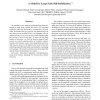732 search results - page 57 / 147 » A Formal Model of Provenance in Distributed Systems |
EDOC
2002
IEEE
15 years 2 months ago
2002
IEEE
Continuous change of user requirements has become a constant for geo-information systems. Designing systems that can adapt to such changes requires an appropriate ethodology that ...
105
click to vote
IPPS
2007
IEEE
15 years 4 months ago
2007
IEEE
We introduce a new model for distributed algorithms designed for large scale systems that need a low-overhead solution to allow the processes to communicate with each other. We as...
PODC
2010
ACM
14 years 11 months ago
2010
ACM
The study of complex networks led to the belief that the connectivity of network nodes generally follows a Power-law distribution. In this work, we show that modeling large-scale ...
COORDINATION
2005
Springer
15 years 3 months ago
2005
Springer
With its decoupling of processes in space and time, the shared data space model has proven to be a well-suited solution for developing distributed component-based systems. However,...
LATIN
2010
Springer
15 years 4 months ago
2010
Springer
Topological self-stabilization is an important concept to build robust open distributed systems (such as peer-to-peer systems) where nodes can organize themselves into meaningful n...

